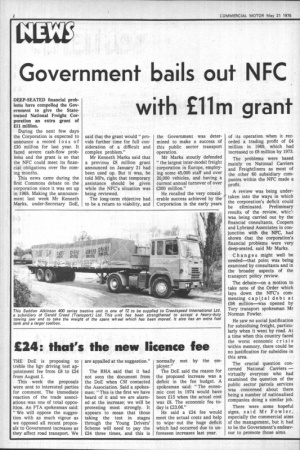Government bails out NFC with Ulm grant
Page 6

If you've noticed an error in this article please click here to report it so we can fix it.
DEEP-SEATED financial problems have compelled the Government to give the Stateowned National Freight Corporation an extra grant of Ell million.
During the next few days the Corporation is expected to announce a record loss of £30 million for last year. It faced severe cash-flow problems and the grant is so that the NFC could meet its financial obligations over the coming months.
This news came during the first Commons debate on the corporation since it was set up in 1968. Making the announcement last week Mr Kenneth Marks, under-Secretary DoE, said that the grant would "provide further time for full consideration of a difficult and complex problem."
Mr Kenneth Marks said that a previous E8 million grant announced on January 21 had been used up. But it was, he told MPs, right that temporary assistance should be given while the NFC's situation was being reviewed.
The long-term objective had to be a return to viability, and the Government was determined to make a success of this public sector transport operation.
Mr Marks stoutly defended 'the largest inter-model freight corporation in Europe, employing some 45,000 staff and over 20,000 vehicles, and having a current annual turnover of over £300 million."
He recalled the very considerable success achieved by the Corporation in the early years of its operation. when it recorded a trading profit of £4 million in 1969, which had increased to £8 million by 1973.
The problems were based mainly on National Carriers and Freightliners as most of the other 60 subsidiary companies within the NFC made a profit.
A review was being undertaken into the ways in which the corporation's deficit could be eliminated. Preliminary results of the review, whic'l was being carried out by the financial consultants, Coopers and Lybrand Associates in conjunction with the NFC, had shown that the corporation's financial problems were very deep-seated, said Mr Marks.
Changes might well he needed—that point was being examined by consultants and in the broader aspects of the tiansport policy review.
The debate—on a motion to take note of the Order which lays down the NFC's commencing capi,tal debt at £98 million—was opened by Tory transport spokesman Mr Norman Fowler.
He saw no social justification for subsidising freight, particularly when it went by road. At a time when this country faced the worst economic crisis within memory, there could be no justification for subsidies in this area.
The crucial question concerned National Carriers — virtually everyone who had examined the question of the public sector parcels services was concerned about there being a number of nationalised companies doing a similar job.
There were some hopeful signs, said Mr Fowler, especially the commercial aims of the management, but it had to be the Government's endeavour to promote those aims.
































































































